The School of speech presented last Thursday 17th February, in Pamplona, the award Luka Brajnovic to degree scroll posthumously to the journalist David Beriain (COM'99).
The award recognises communicators who have stood out for a professional career marked by a defence of freedom, human values and human dignity.
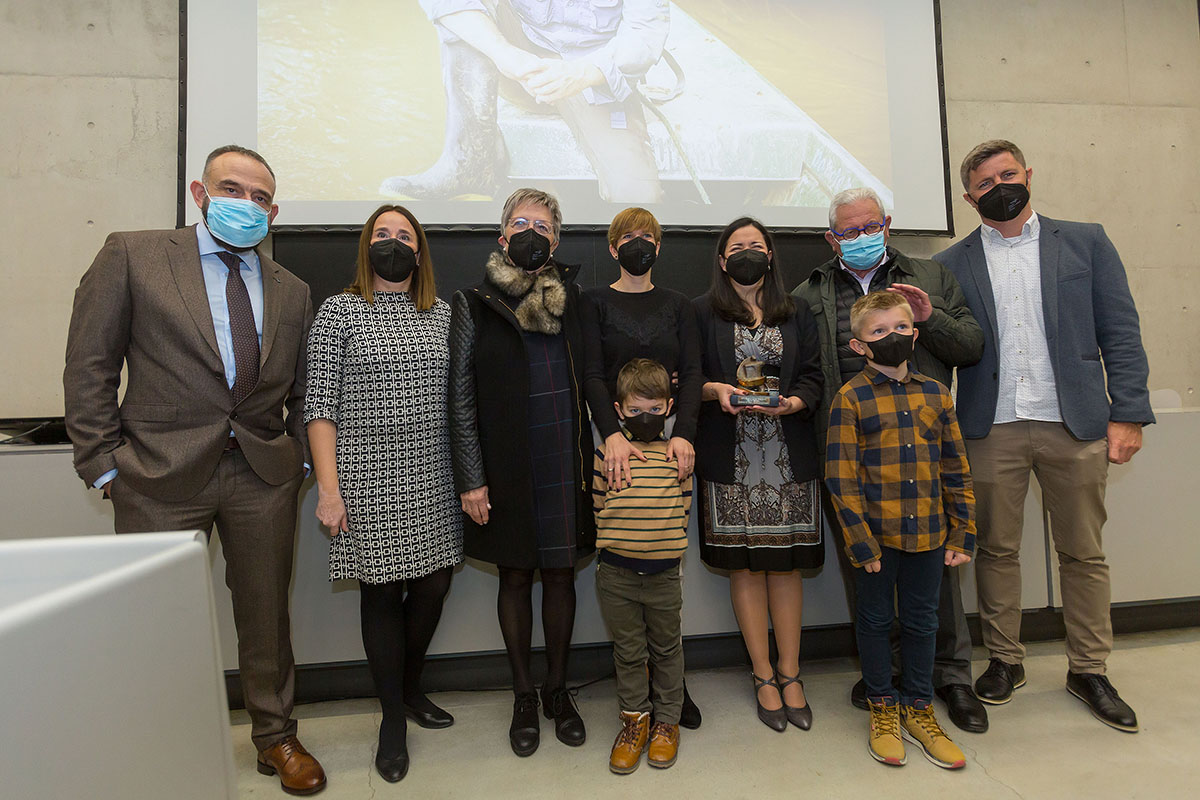
Podcast of his life
Speeches at the event
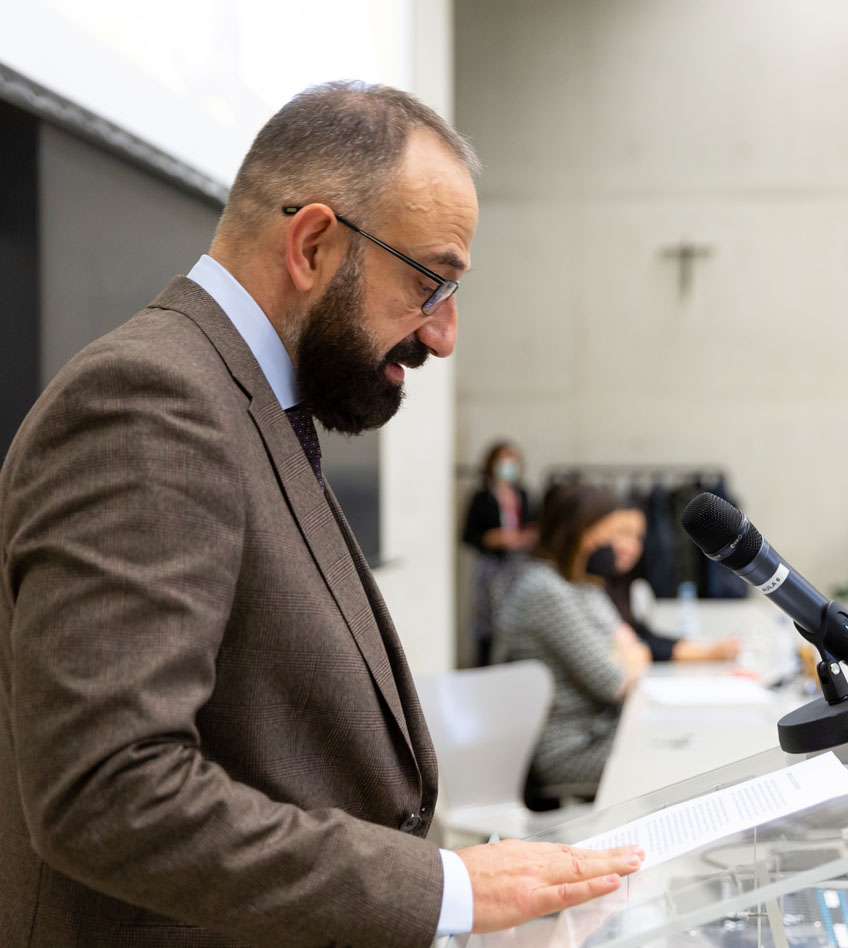
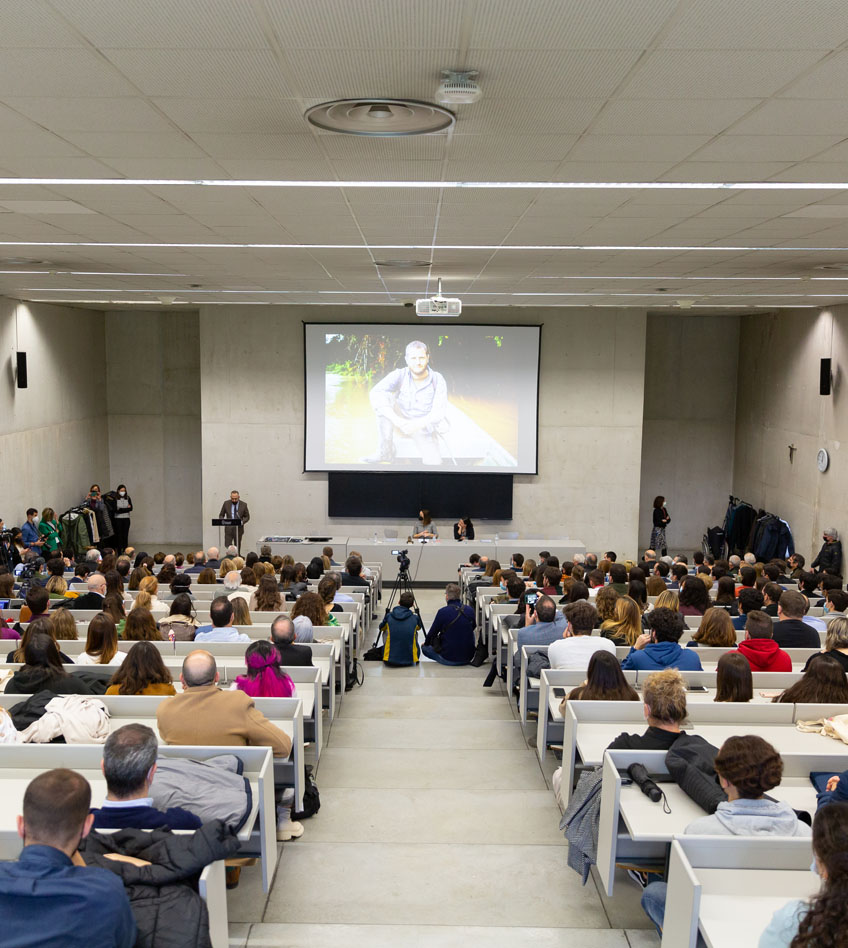
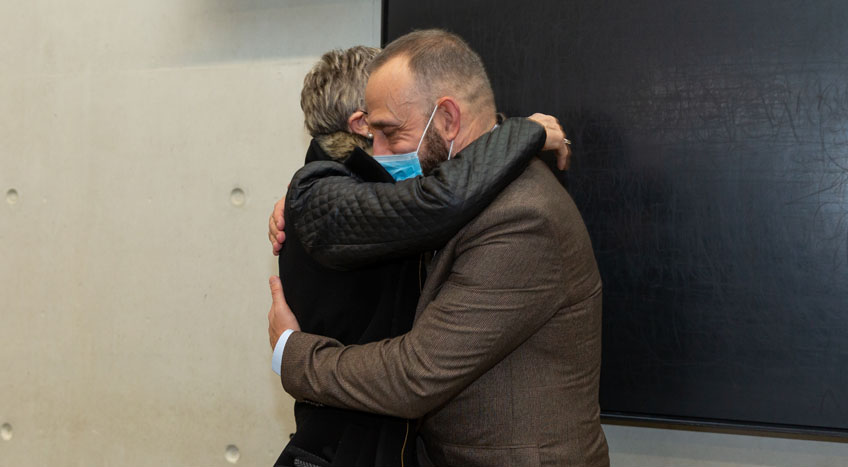
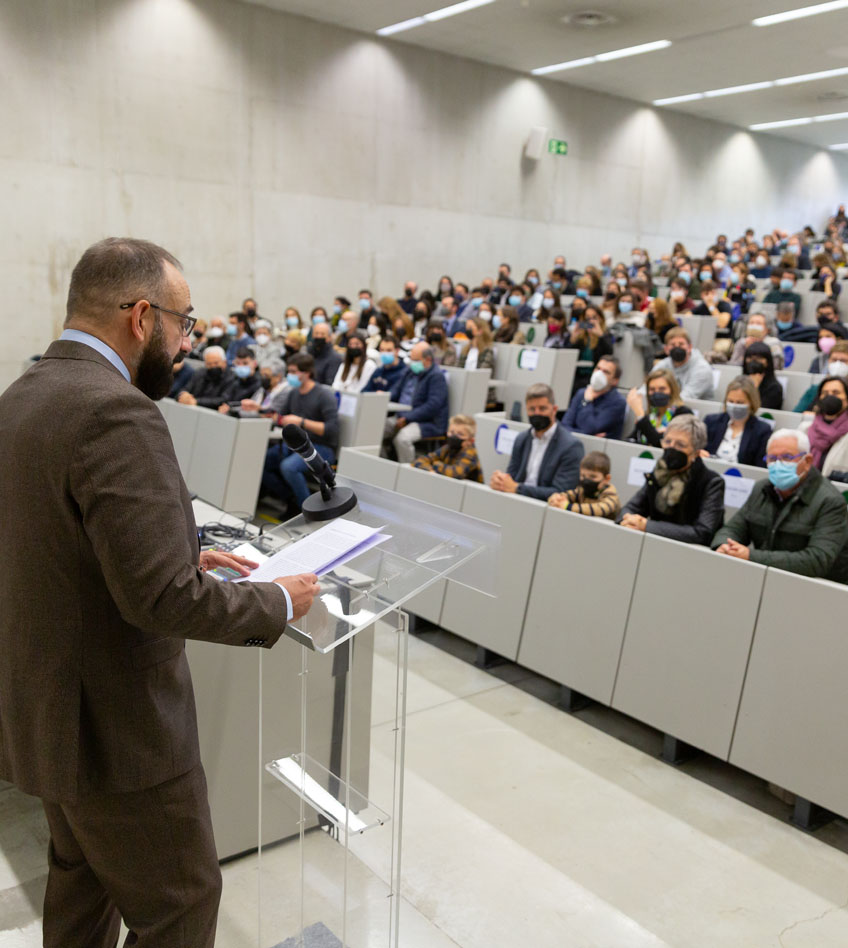
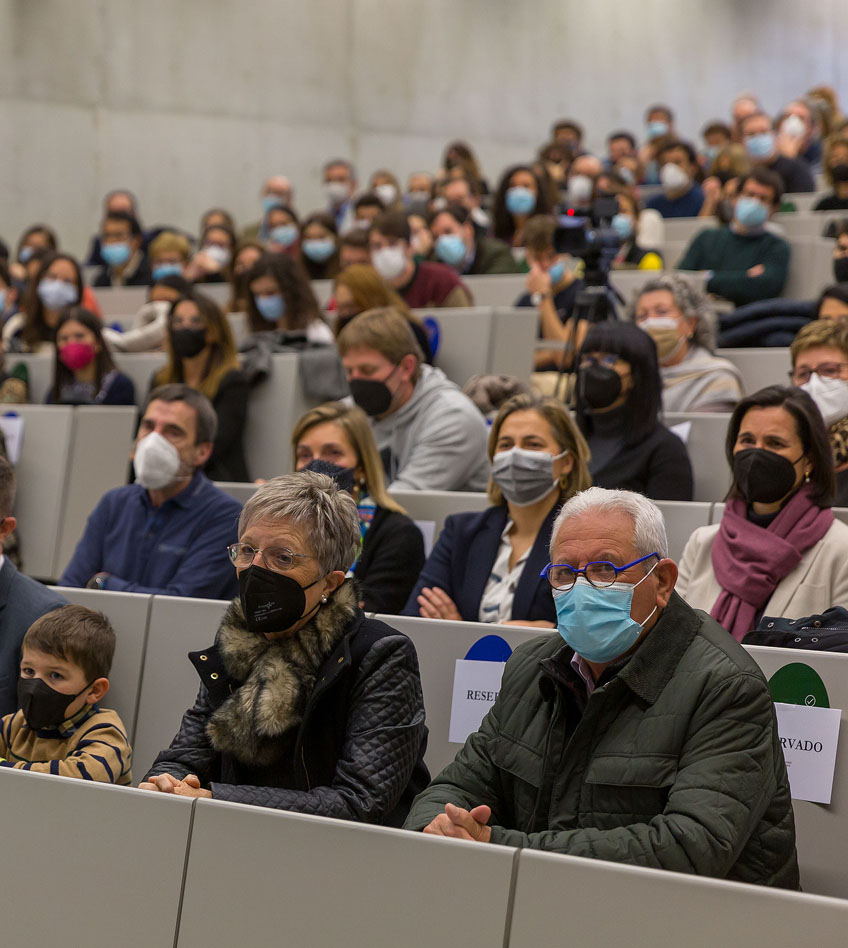
What I remember best was the dust. That ubiquitous cloud of annoying and undefined particles that permanently impregnated your body and presided over the unhealthy atmosphere of Diwaniya wherever you went. In that Iraqi town of unpaved streets and shoeless children playing on them, the generous silhouette of a bearded young man, dressed in light clothes and looking as if he had spent a long time in that hell, emerged one day in the summer of 2003.
Spanish troops had been deployed in this provincial city, halfway between Baghdad and Basra, in the months following the fall of Saddam Hussein's regime, and the Spanish military command had summoned the media representatives to brief us on the mission statement of our country in Iraq. David Beriain had come to the quotation representing La Voz de Galicia, and he was an unknown figure in the scene of the profession, a stranger in a world in which we had all known each other for a long time and even patted each other on the back. A newcomer who, moreover, worked for a media that many could describe as 'regional', and which therefore lacked a tradition of sending reporters to war zones.
David may have looked like an upstart. But as far as information was concerned, rather than a straggler, he was actually the escapee from the pack. Instead of staying in the partial and relative comfort of Baghdad, like the rest of us, the man from Artajona had been living for some time in a sub-hotel in Diwaniya, gaining the trust of the main Shia religious leaders of the town, the real masters of the place after the collapse of the Iraqi state. In other words: he had established a direct link, no more and no less, with the living forces of a territory in which our army had just settled, almost like an astronaut landing on a distant planet. These forces had already told the Navarrese reporter of their dissatisfaction with some of the actions carried out by their members, beginning to unravel the string of falsehoods to which our authorities frequently resorted during that military campaign. I remember perfectly well that when I asked to speak to those same sources, who instinctively distrusted foreigners, the first thing they told him was this: "we have already spoken to David".
In that hot Iraqi September, David and I first established a friendship contact. The friendship, however, took a little longer to forge, I would say a couple of years. The reporter from Navarre was working hand in hand at the time with Sergio Caro, a photographer partner of El Periódico. I had proposed a trip, this time to Afghanistan, and the management of my newspaper in Barcelona made it a condition of their agreement that both of them had to agree to take me as a 'package'. I, the caboose of a journalistic adventure planned and devised by other people's minds, did not even realise that I was about to experience one of the most important trips in my own career as a reporter, a 'game changer' for my professional life, as the Anglo-Saxons would say: thanks to Beriain's talent and boundless charisma, my journalistic horizons were going to open up, freeing me from clichés, psychological barriers and glass ceilings that I had unconsciously built around myself.
Like any other reporter, David had received the usual assignments from the people in charge of his desk, and he carried them out professionally. Talking to civilians, interviewing Spanish military commanders, contacting local authorities, reporting on the status of Afghan women... But he came with a fixed idea that would later become the leitmotiv of his degree program, and that would end up marking his entire career as a journalist. He wanted to gain access to 'the others', to those whom the media speech, for one reason or another, do not talk about and leave aside, whether they are armed militias who are enemies of our governments and armed forces, insurgents described as murderers, hired assassins or even armed groups responsible for kidnappings. The Navarrese sought to get to know them, to unravel their truth, to understand the reasons that had driven them to do what they do. His theory, as he often told me, was that any human being, depending on the circumstances, could act in the same way. He did not even exclude that he himself, having been born in another place and in other circumstances, could end up following in their footsteps.
In the case of Afghanistan, 'the others' had a name that aroused uneasy fear. They were the Taliban, also known as the students of the Koran, who had plunged the country for years during their years in power into an obscurantist and medieval regime, even harbouring the most wanted man on the planet: Saudi Arabia's Osama Bin Laden, manager of the deadliest terrorist attack in history. He who follows gets it, and towards the end of the trip we successfully crowned our purpose when we established a first contact with the forbidden men who defied our country and its allies. And although at the time it was a simple telephone conversation - later would come the face-to-face interviews and camera shoots - it was already a milestone in the history of international journalism in Spain: a Spanish media outlet spoke for the first time with the so-called 'enemy'.
Our second professional partnership took place a few months after that first trip and also took place in Afghanistan. status The security situation had deteriorated dramatically in the meantime, and in the area under the responsibility of the Spanish contingent, US forces had just caused a massacre, with dozens of civilians killed, when they stormed into an unpronounceable town at Spanish to arrest the leader of the local militias, whom they accused of collaborating with the Taliban insurgency. And there, with David, I learned another of the qualities that should characterise a reporter who aspires to excellence: not to let go of a story until it has been fully unravelled.
After a first report on the visit site, which made the front pages of our media speech, David, a natural news hound, refused to turn the page and look for new stories. Far from being content with what had been written and published, something that had already made a big impact in Spain, he insisted that we go to the site every day, asking the locals for something of a pipe dream: to allow us to interview the elusive character who was driving the US military command crazy. After two days of fruitless lobbying and many, many cups of tea, we finally achieved our goal goal.
subject All this was happening while in Madrid, a government allergic to the word "war", on this occasion of a different political colour, was selling all kinds of sweetened versions of what was happening in Afghanistan to a public opinion incapable of checking what was being said by official sources, as hardly any reporters had been sent to Central Asia.
In Afghanistan, a country where the clocks, for religious reasons, do not go forward or backward depending on the time of year, it gets dark much earlier than in Europe. And this meant that on those long evenings that began at 5:00 p.m. and average , the reporter from Navarre and I established a bond that went far beyond professional camaraderie. On the surface, it is true, we were very different. But essentially, as far as our ideas about our profession were concerned, we were on the same page.
David, born in a village in Navarre and accustomed to soap and water as the only morning cosmetics for men, never missed an opportunity to make fun of the contents of my travel bag, full of moisturising creams for men that many of us urbanites from Barcelona have already taken for granted as an unnecessary necessity. When he wanted me to pay attention to him, he would address me at Spanish , imitating a soft Catalan accent, pronouncing the L's with intent and calling me with a twist by the surname and not by name: Marginedassssss.
But I knew that with him, everything was fine. When we went on dangerous forays, whether it was across deserts ripe for a bad meeting, we knew that the three of us, David, Sergio and myself, had each other's backs. We were all in the same boat and we would all suffer the same fate. One for all and all for one. No one would be left behind if things went wrong, or would agree to save his or her own skin at the cost of leaving one of us behind.
I also saw another important element that made me feel in 'spiritual communion' with him: David worked to inform, transmit data and empower our readers to take the decisions they thought appropriate. He was not a member of any political party, cause or ideology, nor was he in the service of any state, not even our own. It was journalism in its purest form, with no other commitment than to truth and freedom of expression. And if that meant embarrassing even our own leaders or diplomatic officials in a foreign country, then it was done.
On these solid foundations instructions, David and I built a relationship staff and a professional one that would turn into an immense pleasure, I repeat, an immense pleasure, the occasions when we worked together, whether it was because we were planning a trip in a coordinated way, Whether it was because we were interviewing Kurdish pro-independence militias in the mountains of northern Iraq in the midst of the military campaign against them launched by the Turkish army, or because we coincided in some war scenario, as when we met in Tripoli to cover the bloody, cruel and chaotic fall of Muammar Gaddafi's regime in Libya.
When we met, we talked about serious things, about status here and there, about this or that war scenario, about the divine and the human, but we also laughed a lot. And he was capable of allying himself with the most painted person to get on my nerves and 'prick' me. I remember how on one occasion, in Iraqi Kurdistan, after a tense and difficult trip to Kirkuk, a city then full of militias fighting each other and where car bombs were exploding every day, he forged an unnatural Navarrese-Andalusian entente, firstly to reduce the stress accumulated during the day, but also to get a kick out of my Catalan-ness. In cahoots with Francisco Peregil, El País correspondent in Rabat, the two of them went off on bulerías, knowing that this is a subject of music that my poor, failing ear is unable to appreciate.
Dean, professors, students and alumni of the School of Sciences of the speech of the University of Navarra: David was, is and will be. instructions He was, because, thanks to his overflowing talent and charisma, he shook the foundations of international journalism in Spain to their foundations, shaking it out of a relative stagnation and, I would say, even provincialism. It is precisely because we are gathered here today to commemorate his figure and examine his work. And I have no doubt that it will be, because in the future his name will reverberate alongside the greats of this field of the profession, whether they be Ernest Heminghway, Archibald Forbes, Martha Gellhorn, Anna Politkovskaya or Manu Leguineche, to mention just a few of the greats of international journalism. Thank you very much
Today is a very special day for School at speech.
We are awarding a new award Luka Brajnovic of speech, instituted in honour of a Professor who left a mark on dozens of generations of journalists; and it is awarded to a former student, David Beriain, with an exceptional career and who receives it, sadly, posthumously degree scroll ; whose portrait has been made by another former student and last award Brajnovic, Marc Marginedas. No one can deny that this is a unique occasion.
I think we all, and many who could not come, wanted to be here, and at the same time none of us would want to be here.
The award that we present today is, at the same time, very fair and very unfair.
It is unfair that David's life, young, vibrant, with an enormous potential to stir consciences, has been suddenly interrupted by criminal interests. That those who ambushed and killed David and Roberto probably didn't even know who they really were, who was waiting for them at home, in Madrid, in Artajona, or who needed their work to make their voice heard, makes it even more unfair.
But at the same time it is an extraordinarily fair and well-deserved award . A professor at School told me on 26 April something that I later heard repeated by other people: "David had profile from award Luka Brajnovic, we all knew that one day he would win it, but never that it would be so soon, nor for this reason".
The just and the unjust. Our life is full of paradoxes that we have to navigate with our limited intelligence and our sometimes overwhelmed emotions.
Paradoxes that David assumed naturally from the beginning of his professional career degree program : deep roots to fly very high.
The freedom to be loved and at the same time to accept that one day those loved ones might receive a very painful phone call final .
Tackle challenge to really know and listen to all people, even those with less than exemplary lives, knowing that he himself could have been in their place.
The people and the world.
The family, the gang, the colleagues and friends, and the millionaire audience to show these unknown worlds to.
The passion for the official document storytelling and the involvement in the management business that could make it possible.
The life, the work and the example of David give sample that these paradoxes of human nature can be reconciled, that they can be lived with illusion, with purpose, with responsibility, with love.
And perhaps we think that the solution to this complicated hieroglyphic is only within the reach of extraordinary people. Because we are all in agreement at agreement: David was extraordinary.
final And here is the last and final paradox: those of you who have had the chance to know him and treat him as a son, husband, friend, partner, colleague, show us an extraordinarily ordinary David: someone who adored his grandmother, who longed and sought to return to the village to eat with his gang, a joker, very Navarrese, and who aspired to teach in the future. Someone who did not let himself be carried away by the glitter that sometimes comes with the public exhibition of this profession.
How can someone who loves the ordinary, the family, the roots, the work made with passion, become so extraordinary?
David was aware of the responsibility of his work. He knew that it did not matter whether he did it in any way or in the best possible way. As we have heard, he was not satisfied with the first answers and he probed until he found the ultimate reasons. He did not just rely on the faces of those who were eager to be on camera, but sought out those who shunned them, or who no one wanted to look at because they were too dangerous, or too compromised.
He also knew that he could not be a good professional if he was not a good person. And he wanted to be a good professional, so it is not surprising that he was also a great, appreciated, loved person.
After the murder of David and Roberto, there have been repeated expressions of affection and affection for his figure, the pain for his loss as a professional, but above all as a colleague, as a friend.
The passion for his work consolidated in David the desire to be a good person, an extraordinary person, turning his talent into a transforming force both inwardly and outwardly. And so he has made real the words of Saint Josemaría Escrivá, founder of this university and direct inspirer of this School: "May your life be a useful life. Leave a legacy".
David was also very aware of the value of freedom: of his own, of the freedom he felt, and of the cost of that freedom to those he loved. Freedom is not mere freedom from bondage. Freedom is commitment, it is a choice of something and a rejection of other things.
Freedom gives us the strength to do what we have chosen and gives meaning even to death itself. Only by understanding this can we think that David died freely: because he wanted to be there, because he did not want to abandon Roberto, because he knew that his work carried radical risks. Because his family, who also understood freedom in this stark but authentic way, knew that to want him free was to be willing to lose him.
And who, in losing him, have gained him forever. In his bequest, in his friends, in his voice, in his work. In his figure that will transcend the limits of his temporal biography. If there is anything we can contribute as School, as his School, to make this happen, it is our responsibility and our honour to do so.
Because David joins a saga of giants who encourage us and lead us to set ambitious goals. They push us to ensure that our educational work produces many brave young people who want to exercise their work with freedom and responsibility, with a joyful, very human, but also very deep commitment. For those who today work as journalists and communicators, David's example financial aid is a reminder that things can be done in a different, better, more profound way. More costly, no doubt, but much more authentic.
In receiving the award Luka Brajnovic of the speech, the name of David Beriáin joins that of other great figures who, like Don Luka, fought to defend universal values such as the defence of truth and freedom of expression. They understood that only in a society where everyone is listened to, including those who nobody wants to listen, can we really talk about progress and the future.
This award allows us to update the beauty of award Luka Brajnovic, to bring it closer to younger generations and to make us understand that technological and social changes make it more necessary than ever to rediscover the human nature that is hidden in those around us and in which our work is rooted. David used to say that it was a mediocre person who did not realise the greatness of the people in front of him because he had already judged them by his own criteria. May this award, and his figure, encourage us to be closer to our friends and colleagues, to those with whom we work side by side and those for whom we work. May we learn to appreciate listening and offer ourselves to be David's substitutes where we are, thus making his bequest even greater.
I did not want to end these words without thanking all of you who have made it possible for us to be here today.
To his mother, Angelines, to Rosaura, to his family for their generosity: for letting us feel David as our own in the midst of your grief. We understand that David was fortunate to have clear references to inspire him.
To Rafa Cores who was able to promote in record time a candidacy that received hundreds of endorsements in just a few hours.
To all the 93 metres team, to all those who took part in yesterday's exciting roundtable , to his colleagues and friends who have answered our questions these weeks and allowed us to produce videos, news and podcasts that take David's figure further and make it bigger.
To Marc Marginedas, who we don't quite know how he put the invasion of Ukraine on hold, but who wanted to be here today to pay this very special tribute to David.
And to the team that has worked on the organisation of this award: to their friends MAJ and Bea, to María and Alvaro, to Amaia and Maga, to Sheila and Canva, and to all those who have dedicated their time, enthusiasm and love.
In a final paradox of this act, I know we will all say that we have received more than we have given.
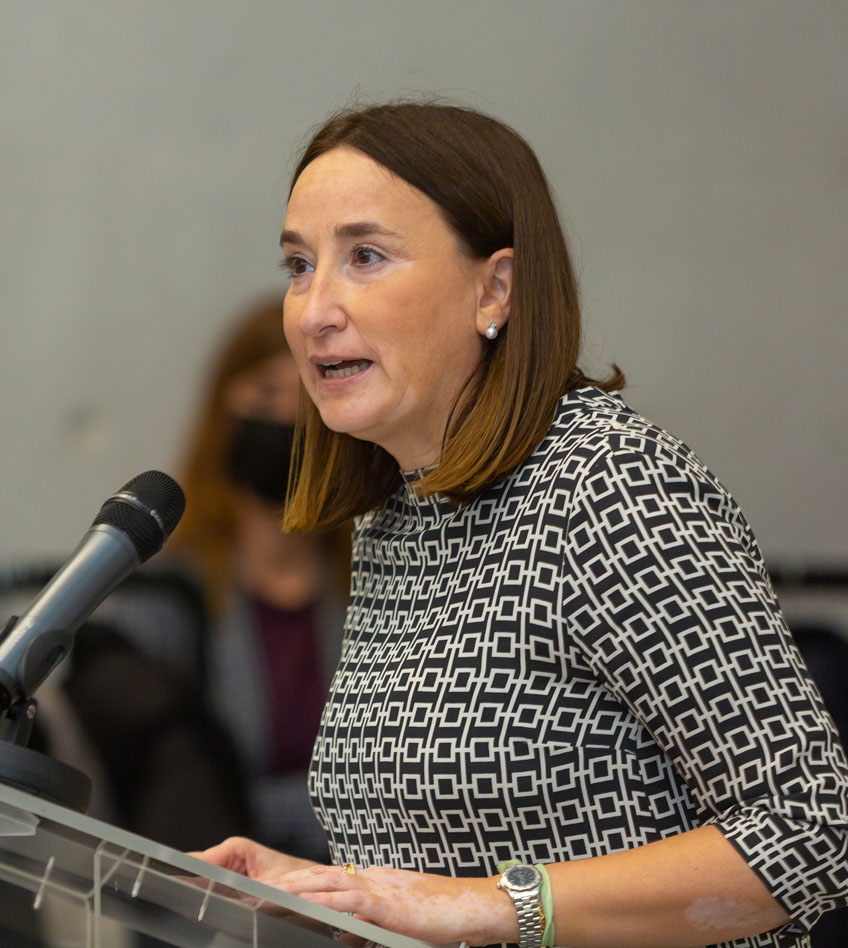
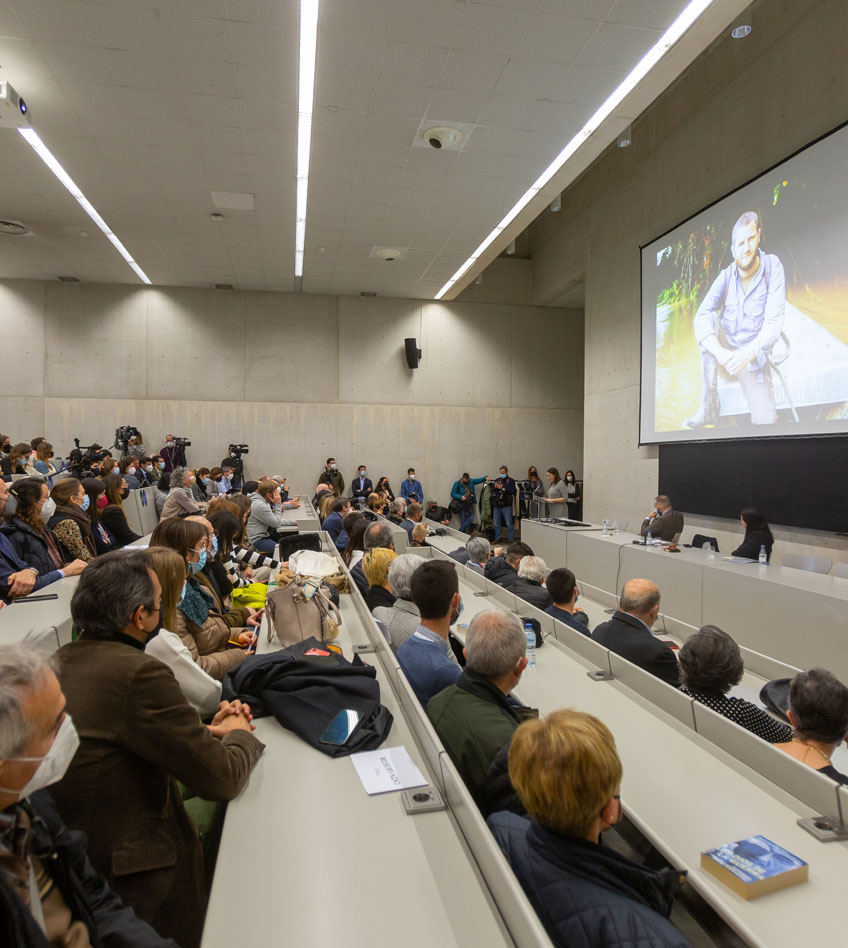
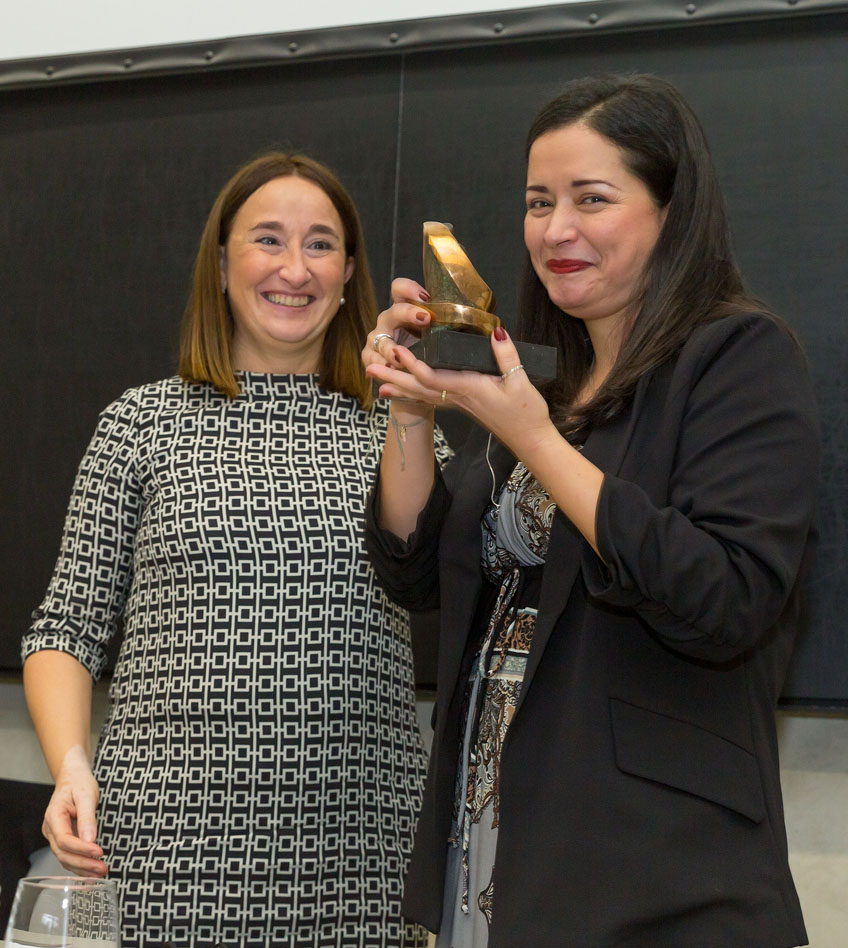
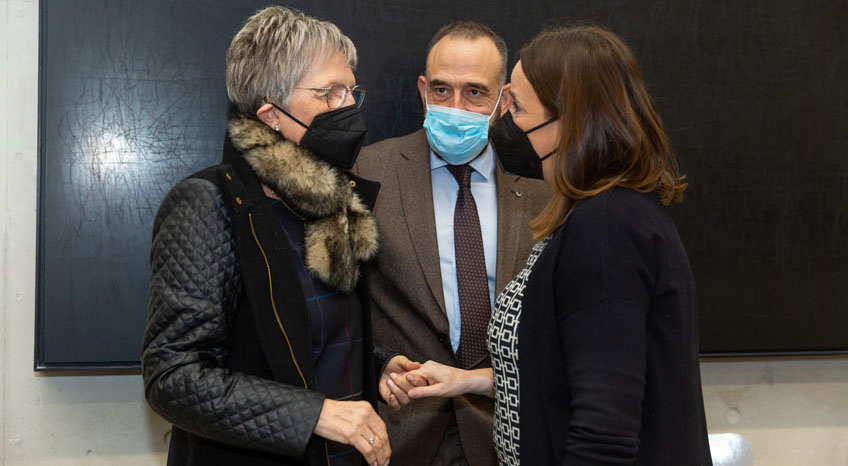
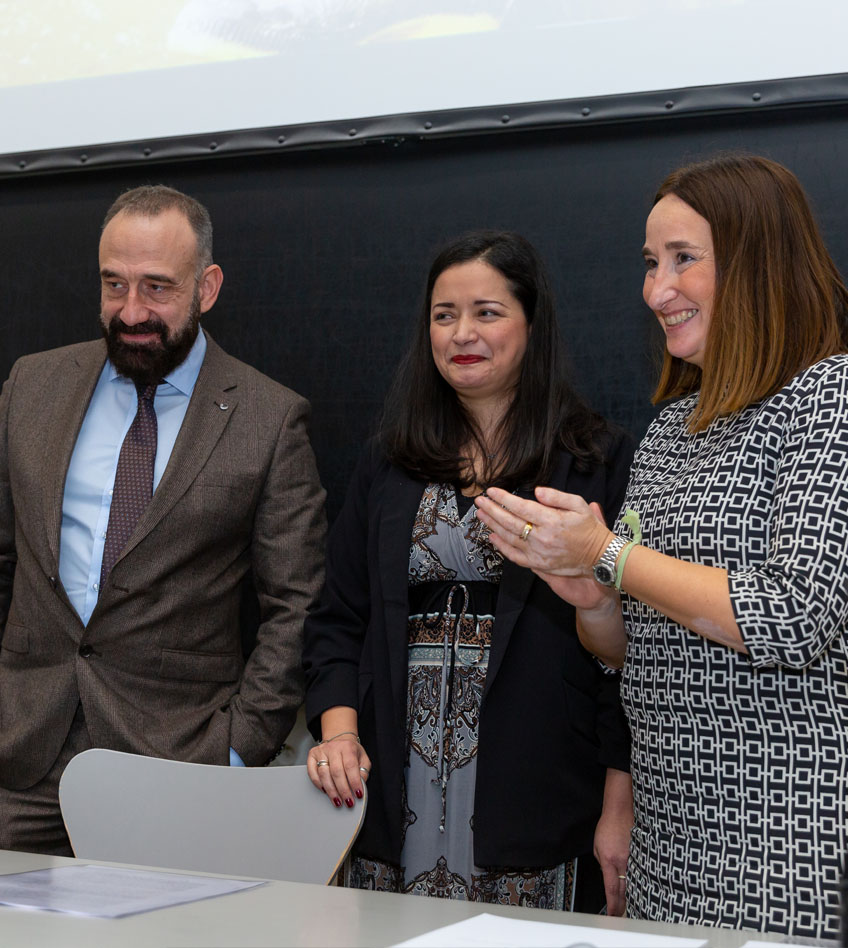
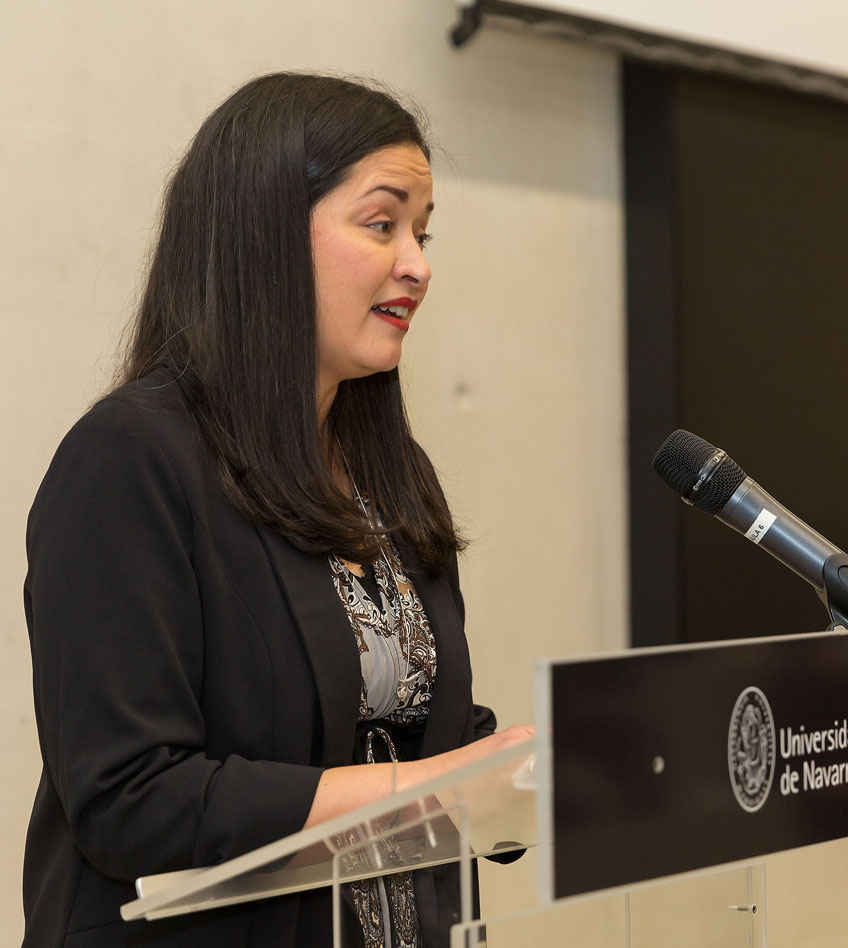
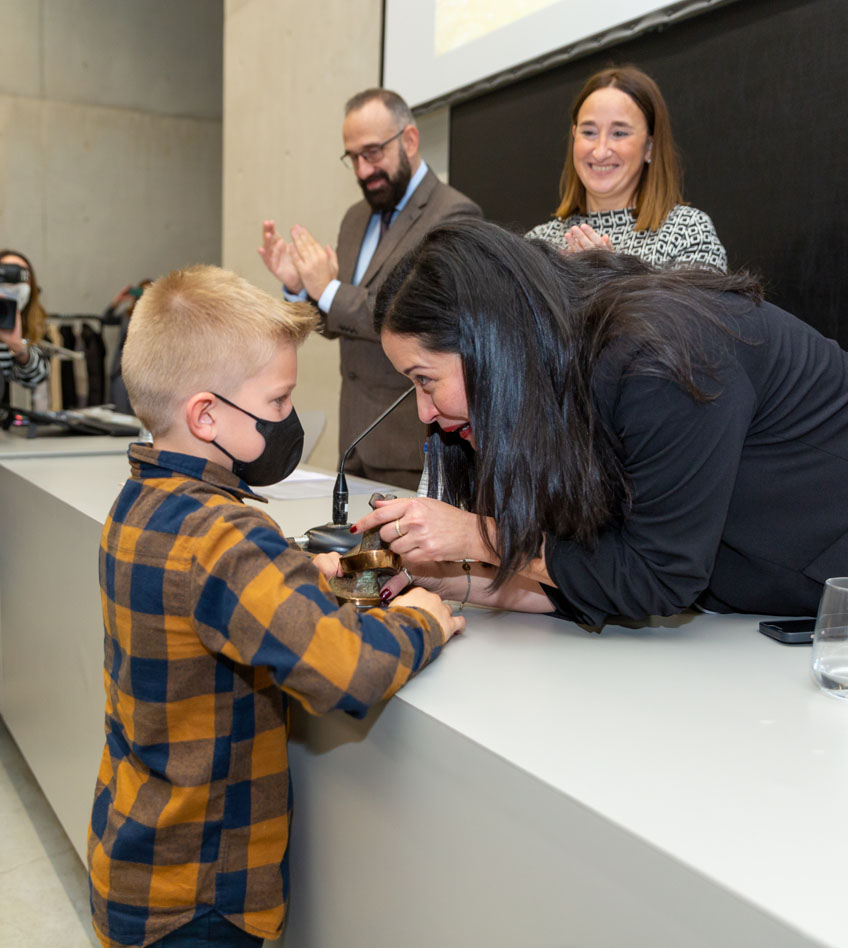
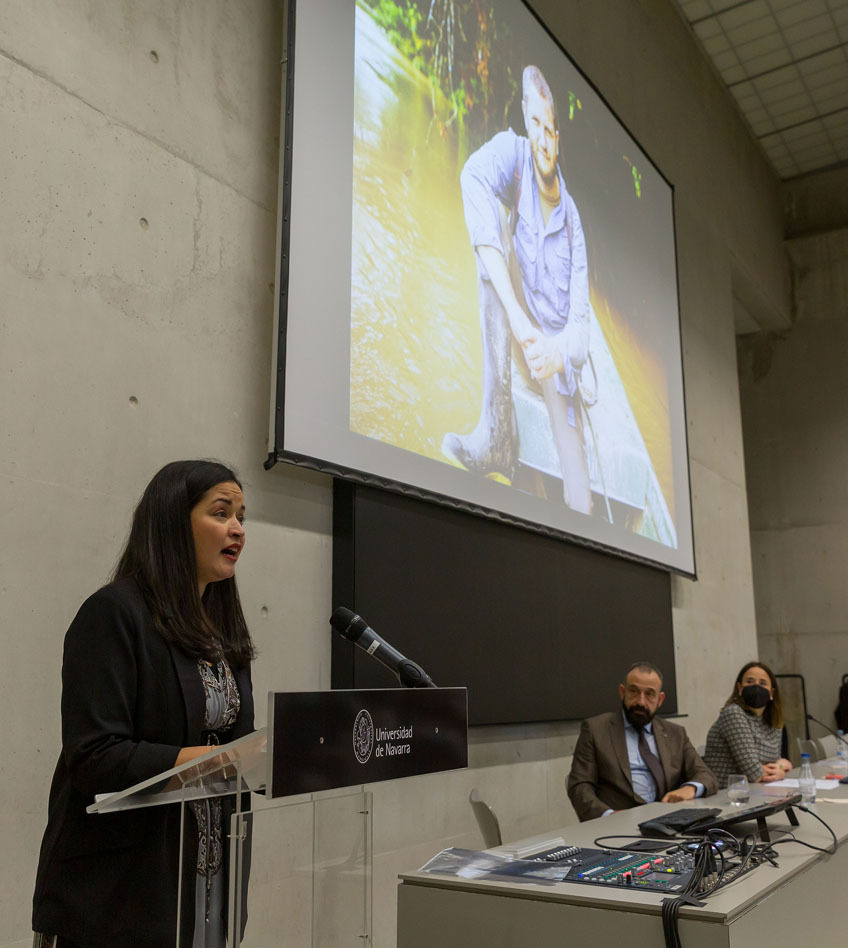
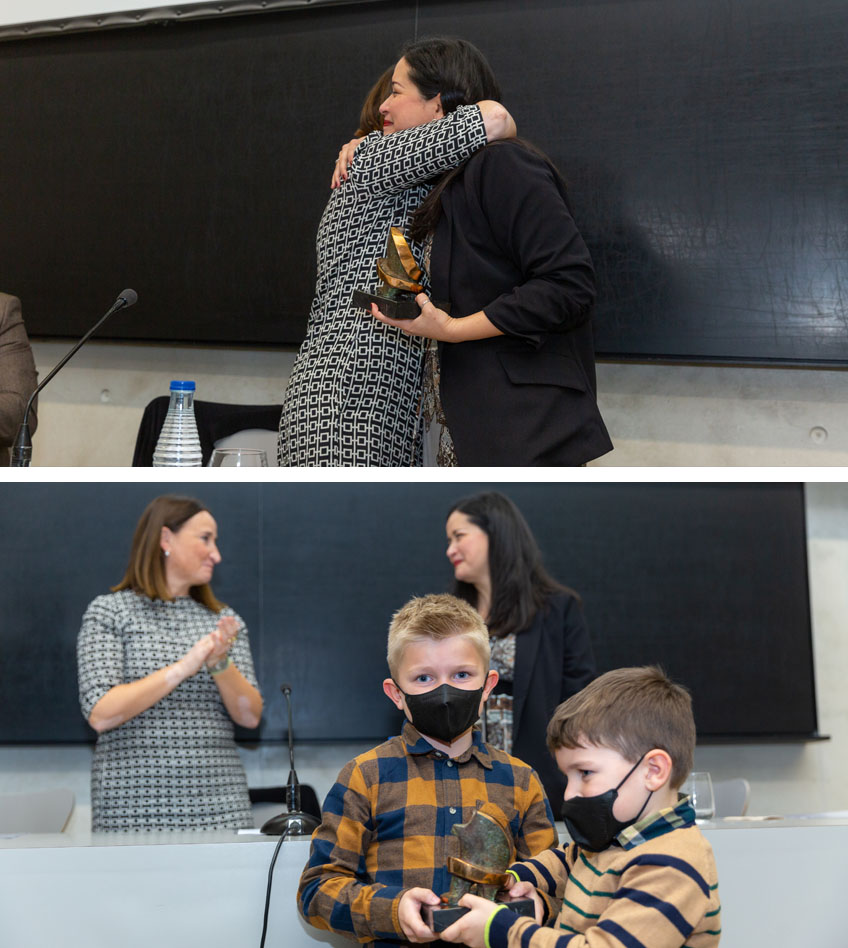
First of all, THANK YOU! To the university, to the organisers, to those present here.
Secondly, forgive my lack of voice, but that's what comes with talking after this marathon of emotions.
And today... what can I say after all that has already been said? What can I tell you? That David was a solid guy. Yes, he was a rock.
He listened. He had the best ears in history and, what's more, he listened and wanted to solve.
That he was a good person, a good journalist, a good friend, a good son, a very good husband... the boy 10, as they used to call him when he was a child.
David...
David didn't dream of becoming a journalist when he was a child. No. But what happened at this university and in his life that you have ended up recognising him with one of the most honourable awards in journalism?
"Lives like David's are rich and fruitful. With the submission of this award we want to make his example and his figure reach further, to contribute to making his bequest, which is still alive in his friends, his colleagues, his classmates and in the heart of the School." This is what the Dean wrote a few months ago when she announced the submission of the award.
And today we are here paying him a beautiful tribute in this university that David entered without knowing very well what the future would hold for him.
He liked writing, talking (a lot), learning, listening, hesitating... At that time, when he had to choose his destination, he hesitated between studying sociology, psychology, politics or going straight to Latin America to dig latrines.
David was a man of contrasts, yes sir! As Paco told yesterday, with the anecdote of the noble red, and Natalia, who described him as the tough guy who went to war and then asked the questions that only a good friend would ask. And that's how he was!
And that is how he is remembered by those close to him, no matter what period of his life we have shared, because it is clear that these characteristics were there since he was a child and remained intact until the end.
David was an onion with many layers. A LOT. And that made him great! All of you who have really got to know him know that. He always said that it was his father, Javier, who said to him: "Why don't you study journalism?
In all these months that have passed since the event, I have had the opportunity to hear anecdotes from his colleagues at class, some of whom have come from far away.
Imagining him at that time, at this classroom, rebellious, with his earring in his ear, with his looks, his beard and his critical thinking... makes me smile. Yesterday one of his teachers told me that before coming to class they used to say: "Let's see what question David comes up with today".
Everyone, absolutely everyone, says that it was clear from then on that David was going to go far. He said that this surprised him because he didn't think so. But perhaps this is what made him always work the hardest. That, as he matured, he understood that his success did not depend on how motivated he felt, but on the work, the mysticism and the dedication with which he involved himself in his day to day work.
It depended on being consistent!
His own fears and insecurities meant that he had an inexhaustible energy, a privileged head that wouldn't stop until he did, and then he enjoyed, danced and laughed with the same intensity.
David had a fruitful life, as the dean rightly said, a fruitful life! And not only in terms of work. He worked in all formats of journalism and in all of them, absolutely in all of them, he did unique stories.
His lectures, many of them given here, were also fruitful. David spent much, much time reflecting on journalism and the role of the journalist. He was very clear that a journalist is only a vehicle between what happens and those of us who are getting the story. And that what happens involves all the parties involved, not just those we are comfortable with.
The reporter, in his transition to audiovisuals, worked in almost all the channels. And if we count only what he has produced since 93 Metres, he has produced more than 50 documentaries. 56 to be exact.
His work travelled the world and won many prizes, none comparable to the pride he took in launching the Artajona rocket.
As a businessman, his obsession was that his team should be happy, happy. Happy in every sense of the word and always, which is impossible, of course.
But David was a boss who asked: "Are you happy, are you well, do you need anything?
Beyond all that, David the journalist, David the businessman... the most remarkable thing was his human qualities. This can be attested to by those close to him: his family, his friends and colleagues, and also - but, listen carefully - and also: the hitman, the drug dealer, the guerrilla fighter...
David was equal with everyone and treated everyone with dignity and respect. That was always the secret of his success! And that is precisely what we should learn from him.
Try to honour him in this way: by being good people, by making a conscious effort to empathise, to put ourselves in the other person's shoes. Not allowing our own fears and insecurities to hold us back in the culture of "I do", "I am", "I AM", "I AM"... - very typical of this profession. Because if you need to claim it, then you are not....
David knew this and applied it in all facets of his life. With his parents, Ángelines and Javier, with his brother, Eduardo, with his uncles, aunts, uncles and cousins...
As a husband, what can I tell you that I haven't already said. I would repeat everything. I have been fortunate to have David as a husband and if I am strong and keep going it is because I think that is what he would want.
And as a journalist, producer, audiovisual creator, entrepreneur... you have already heard it from qualified people close to you.
This award is about those values that David made his own and defended to the hilt: freedom, honesty, dignity. Of that, of having practised journalism with humility, knowing that the most important thing is respect for others - no matter who they are.
On behalf of David, of our family here, of Artajona, of Uterga and a little bit of Latin America... From the bottom of my heart, thank you very much!

